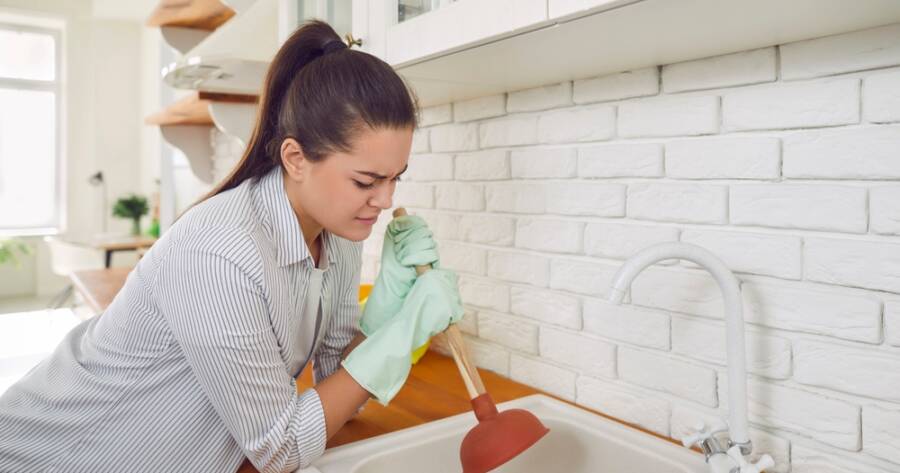Keeping your pipes clean and clog-free is essential for a smooth-running home. Blocked pipes can lead to unpleasant smells, slow drainage, and even water damage. With a few simple methods, you can avoid these issues and maintain your pipes effectively. Now, let’s look at easy ways to clean and unclog your pipes using everyday tools and products.
1. Understanding Common Causes of Pipe Clogs
Pipe clogs often start small and gradually worsen over time. The most common causes include hair, grease, soap scum, and food particles. In bathrooms, hair and soap build up, leading to blockages. Kitchens see grease and food waste as the main culprits.
Additionally, flushing non-flushable items down the toilet can lead to severe clogs in the main drain line. By recognizing these causes, you can take steps to prevent them before they turn into costly problems.
2. Simple DIY Techniques for Cleaning Pipes
Fortunately, many pipe clogs can be fixed with basic household items. Start with hot water—boiling water poured down the drain can dissolve grease or soap buildup in kitchen pipes. For tougher clogs, baking soda and vinegar is a popular solution. Pour half a cup of baking soda followed by half a cup of vinegar down the drain, let it sit for 10-15 minutes, then rinse with hot water. This mixture creates a bubbling action that can help break up debris and leave your pipes smelling fresh.
For more stubborn clogs, a plunger or plumber’s snake can be useful. A sink plunger is great for minor clogs in bathroom and kitchen sinks. Plumber’s snakes, on the other hand, are long, flexible tools designed to navigate through pipes and break up tougher blockages. These tools are affordable and worth keeping on hand for unexpected clogs.
3. Maintaining Clean Pipes with Regular Drain Care
Regular drain care helps prevent buildup that can lead to clogs. You can easily add these steps to your monthly routine. Pour hot water down each drain once a month to prevent grease and soap buildup. Additionally, consider using enzyme-based cleaners; these natural cleaners use beneficial bacteria to break down organic materials, preventing buildup in your pipes. Unlike harsh chemical drain cleaners, enzyme cleaners are safe for the environment and won’t harm your plumbing.
If you’re looking for a simple preventive measure, drain strainers are effective at catching hair and food scraps before they enter your pipes. They’re inexpensive and can save you from frequent clogs, especially in sinks and showers. By consistently using drain strainers and scheduling monthly cleaning, you can help your pipes stay clear and avoid the hassle of dealing with clogged drains.
4. Knowing When to Call a Professional
While DIY methods work for most clogs, some situations require a professional’s touch. If water backs up in multiple drains, you could be facing a serious blockage in your main drain line. This often requires special tools and expertise to fix. Other warning signs include slow drainage in multiple sinks, foul odors, and frequent clogs that don’t fully resolve with home remedies.
Professional plumbers have tools like hydro-jetters, which use high-pressure water to remove stubborn clogs and deep-clean the inside of pipes. They also have video inspection equipment to locate and identify clogs, leaks, or other issues within the pipe system. Calling a plumber may seem costly, but it can save you money by addressing problems before they escalate.
5. Avoiding Common Mistakes with Pipe and Drain Cleaning
When cleaning pipes, it’s important to avoid some common pitfalls. For example, using chemical drain cleaners too frequently can harm pipes, especially if they’re older. These products are effective for dissolving clogs, but they contain harsh chemicals that can erode pipes over time, leading to leaks. It’s best to reserve these for emergencies and rely on more natural solutions whenever possible.
Additionally, avoid using excessive force when plunging or snaking a drain. Too much pressure can damage pipes, especially if they’re already weakened by age or corrosion. Stick with gentle plunging and cautious use of plumbing snakes to keep your pipes safe from damage. By handling clogs carefully, you can maintain your pipes without causing additional issues.
Keeping Your Pipes Clean and Clear
Keeping your pipes clean and clear doesn’t have to be difficult. Regular maintenance, such as using hot water and enzyme-based cleaners, can go a long way in preventing clogs. For minor clogs, DIY solutions like baking soda and vinegar or a plunger can often do the trick.
However, knowing when to call a professional is key to avoiding bigger problems. By taking these preventive steps and following safe cleaning practices, you can enjoy clear, clog-free pipes in your home year-round.
